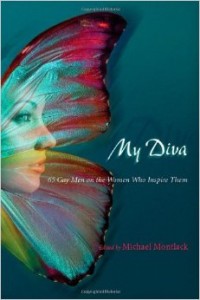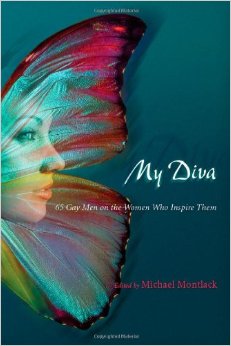 My Diva: 65 Gay Men on the Women Who Inspire Them
My Diva: 65 Gay Men on the Women Who Inspire Them
Edited by Michael Montlack
Wisconsin. 320 pages, $24.95
THE ACTRESSES Marlene Dietrich, Gloria Swanson, Joan Crawford, and Bette Davis, comedian Gracie Allen, Julia Childs, Queen Elizabeth I, and even two fictional characters, Endora (Agnus Moorehead) of Bewitched and Wonder Woman (Lynda Carter) are among the women who make it into My Diva, an anthology of short essays, each a few pages long, by writers and poets on the famous women who affected their lives.
My Diva stretches any ordinary definition of the word “diva,” as most of the women included here are not singers, much less prima donnas. The essence of a diva, according to contributor Jeff Oaks, is “her ability to be apart from humanity, to be larger than life, to be beyond it, like a goddess.” According to Ron Palmer, the mark of a diva is a physical beauty that lasts well into maturity (as it has for his diva, Raquel Welch, who reminds Palmer of his mother). Steven Riel observes in his essay on Cyndi Lauper that her “voice takes center stage, and in songs like ‘If You Go Away,’ she lingers achingly over anguish.”
One unifying theme in My Diva is the fullness and depth of emotion that’s evoked by these women. Riel recalls how “the frightened gay little boy [he]once was still marvels at the courage and strength he can find when joining with hundreds, if not thousands of gays and lesbians … singing ‘Girls Just Wanna Have Fun’ at the top of their lungs at a Cyndi Lauper concert.” Aaron Smith was so awestruck on meeting Cher in person at a book signing that he was speechless: “It never occurred to me to plan what to say!”
A common theme in these accounts is the way in which one’s diva helped these authors to cope with crises large and small, whether playground taunts, coming out, homophobia, loneliness, death, divorce, or victimization. Patrick Letellier’s grief over the death of a longtime friend was soothed by none other than Queen Elizabeth I. Mark Wunderlich found solace as a young child from Julie Andrews’ performance in The Sound of Music, and notes how, on a high school trip to Salzburg and a Sound of Music tour of the city, the group “ran, arms spread wide, heads back to spin and spin, until we fell or just got tired and returned to the bus down the mountain.” Steven Cordova recalls walking down the streets of New York as an openly gay man bellowing “Hello in There,” a song from Bette Midler’s album The Divine Miss M— the same album to which he and a friend “tapped [their]feet and shook [their]hips” when he was fifteen. Scott Stoddart recounts being abused as a child and coping with his parents’ divorce by reading about Elizabeth Taylor’s “divorces and desire to find love.”
Not all of the stories are about adversity. Michael Broder recalls “falling for [his]first great love” in real life at the same time that he learned about Sappho, which is what turned him on to poetry. Brian Teare describes his connection with Virginia Woolf as that of a teacher and a student, and expounds upon the influence she has exerted on his intellect and his life. What draws these gay men to their divas is an aura that’s variously described as confidence, strength, “steely toughness”—but also, in some cases, their mystery.
My Diva can be enjoyed for its simplicity, its campiness, and its forthrightness. One thing that’s surprising about the book is the absence—even with a sample of 65 “divas”—of some women that leap immediately to mind when this word is used. What, no Judy Garland, no Streisand, no Joni Mitchell? Only one authentic diva in the strict sense made the cut, namely Joan Sutherland, while that über-diva of the century (or so one thought), Maria Callas, is nowhere to be found. Of course, this is not a book on the “greatest” divas of all time but instead a series of highly personal reflections on the power of women to transform gay men’s lives.







